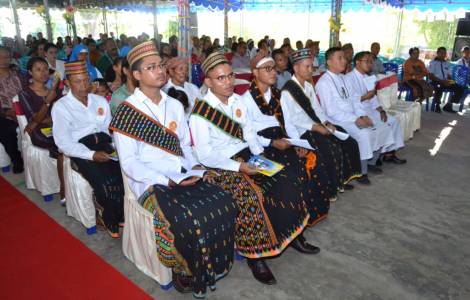by Paolo Affatato
Denpasar (Agenzia Fides) - Many visitors and tourists in Bali, the Indonesian island popular with tourists from all over the world for its attractions, also stop at the Catholic church dedicated to Saint Francis Xavier in the Kuta area, not far from Denpasar airport. On the facade of the church, the statue of Christ and the statue of the patron saint of the missions who proclaimed the Gospel in Asia stand out. The community volunteers of the parish are very hospitable: they even stop traffic to allow the mostly foreign visitors to access Mass (which is celebrated in English and in the local language, Bahasha) or to pray. In the church, the faithful like to pray the "Novena to Saint Francis Xavier", which takes place mainly in March and December.
Sunday masses are full of young people who talk about their admiration and affection for Saint Francis Xavier.
The same is true in the cathedral dedicated to Saint Francis Xavier in the Indonesian city of Ambon, in the Catholic diocese of Amboina, where a monument is also dedicated to the saint, inaugurated in 2014 to commemorate his arrival on this island. Located in the village of Great Hative, in Ambon Bay, the monument overlooks the sea where the Jesuit missionary landed on February 14, 1546. We are in the Moluccas, also known as the "Spice Islands", which in past centuries attracted Portuguese and Dutch settlers wishing to establish trade with Europe. It was here that Francis Xavier landed, preached the Gospel and baptized the first inhabitants of the islands of Ternate and Tindore, thus beginning the spread of Christianity in the Moluccas, which later became part of present-day Indonesia. In the Diocese of Amboina, there are still traces of Catholic communities that - in an area with a majority Protestant community - date back to the work of the saint: places such as Tual, Tanimbar, Kei and small islands in the Moluccas, 99% of which are inhabited by Catholics.
The initiative to erect a monument was supported by the Association of Indonesian Diocesan Priests ("Unio Indonesia"), together with the local bishop, who say they "venerate Francis Xavier and see in him a model for the priest and evangelizer."
On the island of Java, which belongs to the Archdiocese of Jakarta, the Church of St. Francis Xavier in Tanjung Priok (North Jakarta), built in 1970 and with space for 1,000 believers, is an important center of spirituality for many Catholics and a place where pilgrims come to entrust their prayer requests or to ask the Spanish saint for special graces.
Saint Francis Xavier is also a firm point of reference for religious communities. "We draw inspiration from our patron saint and model, Saint Francis Xavier," say the Xaverian missionaries from Yogyakarta in Central Java, who already bear the Spanish saint in their name and charism.
One of the many examples is the Brothers of Christian Education of Ploërmel (FICP), a male religious institute dedicated to education and Christian upbringing founded by the French theologian Jean-Marie Robert de La Mennais (1780 - 1860), which has named its "district" (province of the order) in Indonesia after Saint Francis Xavier and promotes the figure of the saint in its schools. "This is how one of the young men who entered the congregation in 2019 and took his religious vows on the island of Flores chose the name Franciscus Xaverius Gua Making," they recall.
The name Francis Xavier is the first name of many Indonesians and is also the name of many Catholic schools, parishes and institutes. It will also be the name of the new basilica and Jesuit college in Nusantara, the new capital of the Republic of Indonesia (see Fides, 29/7/2024).
The Indonesian Jesuits make strong reference to the saint, recalling that after their confrere Francis Xavier and inspired by him, "other Spanish and Portuguese Jesuits followed his example and established missions in eastern Indonesia until the mid-16th century". In 1859, the Jesuit mission in Indonesia was resumed with the arrival of two Dutch priests, Martinus van den Elzen and Joannes Baptista Palinckx. Many Jesuit priests and brothers then came from the Netherlands and their mission laid the foundations of the current structure of the Catholic Church in Indonesia.
The Jesuit presence at that time had the legal status of the “Mission Java”, whose spiritual reference point was always Saint Francis Xavier. Important was the work of the Dutch missionary Father Franciscus Georgius Josephus van Lith (SJ), who was awarded the Order of Merit by the Indonesian Ministry of Education for his missionary and educational work in Central Java. The Jesuits founded the first Catholic school in Muntilan, which accepted students regardless of their religious, cultural or ethnic background. This school was also attended by Father Albertus Soegijapranata (SJ), who would later become the first bishop of Indonesia and is now considered one of Indonesia's national heroes, remembered by Javanese Catholics especially for his contribution during the Indonesian struggle for independence.
Today there are about 330 Jesuits in Indonesia working in parishes, schools, universities, social centers, publishing houses, magazines and spirituality centers. Thanks to the work of Indonesian priests and religious, as well as missionaries, Indonesian Catholics feel and define themselves as "children of St. Francis Xavier".
The devotion to the saint, which is widespread especially in the predominantly Catholic areas, is expressed in a special way on December 3, the feast day of Saint Francis Xavier, when various Catholic communities commemorate him with special masses, processions and prayers. The celebrations often reflect local culture and tradition, and include elements, customs, music and dances typical of the many different cultures that make up the cultural mosaic of Indonesia. (Agenzia Fides, 3/9/2024)

